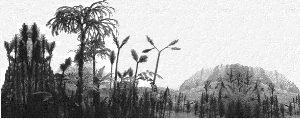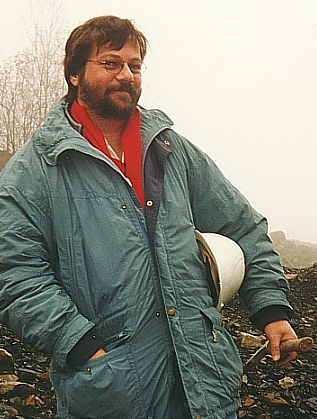 |
|
 |
 Prof.
Dr. Hans Kerp (11 September 1954, Venlo, The Netherlands) studied
geology from 1972 to 1980 at the University Utrecht (The Netherlands).
His principal research subjects were stratigraphy and palaeobotany with
sedimentology and history of science as additional research subjects. He
obtained his Ph.D. in 1986 for a thesis on the genus Callipteris
in the European Rotliegend. From 1980 to 1989 and from 1990 to 1991 he
was appointed at the Laboratory of Palaeobotany and Palynology in Utrecht,
first as a research assistant and since 1987 as a lecturer. In 1989 and
1990 he was appointed as research associate in the Department of Geology
of the University of Pennsylvania, Philadelphia, U.S.A. Since September 1991
he is professor of palaeobotany at the Westfälische
Wilhelms-Universität
in Münster. His research concentrates on Palaeozoic and Early Mesozoic
floras, and focuses on the palaeobiology and palaeoecology of fossil plants,
palaeophytogeography and fossil cuticles. He is editor of two journals:
Albertiana,
the newsletter of the International Subcommission on Triassic Stratigraphy,
and the Review
of Palaeobotany and Palynology. In addition, he is is a member of the
editorial boards of Palaeontographica
Abteilung B - Phytopaläontologie, the journal Geolines
of the Institute of Geology of the Czech Academy of Sciences, and
"Mitteilungen
aus dem Museum für Naturkunde der Humboldt-Universität zu Berlin,
Geosciences". In 1995 he was elected as chairman of the German "Arbeitskreis
für Paläobotanik und Palynologie".
Prof.
Dr. Hans Kerp (11 September 1954, Venlo, The Netherlands) studied
geology from 1972 to 1980 at the University Utrecht (The Netherlands).
His principal research subjects were stratigraphy and palaeobotany with
sedimentology and history of science as additional research subjects. He
obtained his Ph.D. in 1986 for a thesis on the genus Callipteris
in the European Rotliegend. From 1980 to 1989 and from 1990 to 1991 he
was appointed at the Laboratory of Palaeobotany and Palynology in Utrecht,
first as a research assistant and since 1987 as a lecturer. In 1989 and
1990 he was appointed as research associate in the Department of Geology
of the University of Pennsylvania, Philadelphia, U.S.A. Since September 1991
he is professor of palaeobotany at the Westfälische
Wilhelms-Universität
in Münster. His research concentrates on Palaeozoic and Early Mesozoic
floras, and focuses on the palaeobiology and palaeoecology of fossil plants,
palaeophytogeography and fossil cuticles. He is editor of two journals:
Albertiana,
the newsletter of the International Subcommission on Triassic Stratigraphy,
and the Review
of Palaeobotany and Palynology. In addition, he is is a member of the
editorial boards of Palaeontographica
Abteilung B - Phytopaläontologie, the journal Geolines
of the Institute of Geology of the Czech Academy of Sciences, and
"Mitteilungen
aus dem Museum für Naturkunde der Humboldt-Universität zu Berlin,
Geosciences". In 1995 he was elected as chairman of the German "Arbeitskreis
für Paläobotanik und Palynologie".
Hagen Hass (24 November
1947, Bartensleben, Germany) is appointed as a technician in a DFG-funded
research project on "growth forms of Early Devonian land plants - their
development and functional morphology". This project is carried out in
cooperation with Prof. Dr. Volker Mosbrugger (Tübingen) and started
in February 1996.

Sunia Lausberg (7 September 1969, Hamburg, Germany) studied geology at the University Münster from 1989 to 1997 and her M.Sc. dealt with the Late Permian flora from Midtkap, Frederick E. Hyde-Fjord, north Greenland. Together with Prof. Dr. Robert H. Wagner (Cordoba, Spain) and Dr. Serge V. Naugolnykh (Moscow, Russia) she currently finishes a manuscript on this flora. Sunia now works on het Ph.D. thesis on the Rotliegend hinterland floras of the Saar-Nahe Basin, a research project funded by the DFG.
Anke Grewing (6 December 1971, Georgsmarienhütte, Germany) studied geology at the Univeristy Münster and obtained her M.Sc. in 1997. For her M.Sc. thesis she mapped in Dickson Land (Spitzbergen) and also carried out palynological analyses of a series of Devonian and Carboniferous samples from this area. Anke currently works on her Ph.D. research project on the vegetation dynamics in the Stephanian of western Europe. This project is funded by the German Science Foundation (DFG) and concentrates on the French Massif Central and the Saar-Nahe Basin.
Wolfgang Peters-Kottig (7 August 1972, Dülmen, Germany) studied geology at the University Münster between 1993 and 1999. His M.Sc. dealt with applied and environmental geology. In October 1999 he started his Ph.D. research on carbon isotope studies of terrestrial organic material in the light of the climatic and palaeobotanical evolution during the Late Palaeozoic. This project which is a cooperation of Prof. Dr. Harald Strauß (Historical and Regional Geology) and Prof. Dr. Hans Kerp (Palaeobotany) is funded by the German Science Foundation.
Dr. Véronique Daviero (1 July 1970, Briançon, France), studied in Montpellier (France) where she also obtained her Ph.D. in 1998. From September 1998 to September 1999 she was working as a post-doc at the Forschungsstelle für Paläobotanik. She had a Marie Curie Stipend (TMR) of the European Community and worked on the computer modelling of Early Devonian Rhynie Chert plants. These computer simulations are carried out in cooperation with CIRAD, Montpellier. In September 1999 Véronique started in a permanent research and teaching position in Lyon.
Wolfgang Brock, Tobias Dankbar, Christian Dechert and Susanne Knoblauch are currently appointed as teaching assistents in the Forschungsstelle für Paläobotanik.
| © Forschungsstelle für Paläobotanik, Westfälische Wilhelms-Universität Münster |
March 2000
|